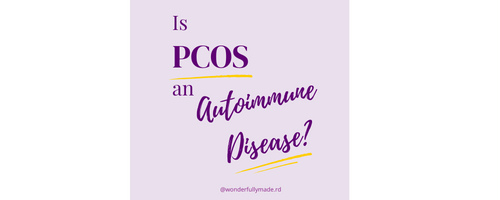Eating Less But Gaining Weight? Do These Successful Steps Instead.
How can it be possible to be eating less but gaining weight?
It seems counterintuitive, especially since most of us have been told for decades that weight loss is simply a game of calories– eat less than you burn, and you will lose weight. But it is indeed possible to be eating less but gaining weight.
Why? What if I told you that calorie restriction doesn’t get to the root cause, and it often even backfires? All too often prioritizing calorie restriction actually ends up leading to a slow metabolism, leading to major fatigue, cravings, thyroid issues, and making your body hold onto body fat. This is what so often causes weight loss resistance in women.

Why can’t I lose weight no matter what I do?
An all too common thing I see women doing before working with me is actually undereating. Yep, that’s right– undereating and yet still not losing weight. But it may not look like what you think. Let’s see if you have found yourself doing these same things or have seen these signs of undereating.

#1: You skip meals regularly, often breakfast or lunch, to reduce calories.
You think, I’ll save some calories at the same time. And maybe I can consider it “intermittent fasting”, so it must be healthy, right?
#2: You skip meals regularly, often breakfast or lunch, because you don’t give yourself time to eat these meals during the day.
Maybe the extra calories I save will make up for the unhealthy schedule I’m living? Yikes, no.
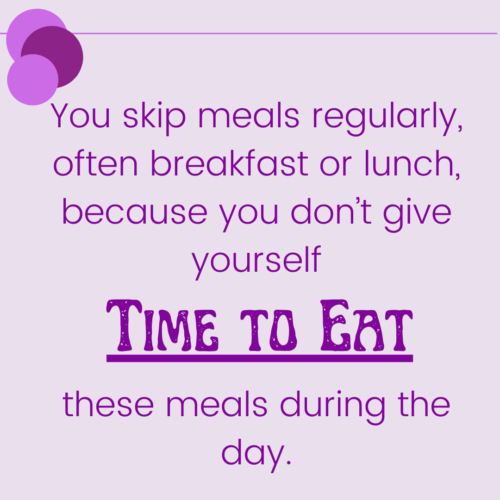
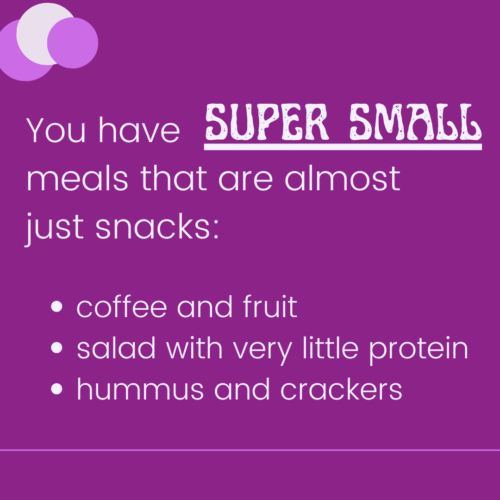
#3: You have super small meals that are really just snacks, like:
- Coffee and fruit
- Salad with very little protein
- Hummus & crackers
Because again, the lower the calories, the better, right?
#4: You have hypothyroidism.
Thyroid dysfunction is often due in part to lack of eating enough nutrients & calories overall. Nutrition plays a monumental role in all aspects of the thyroid hormone journey. Getting enough food overall tells the body all is well so that thyroid hormones can do their job and keep your metabolism running.
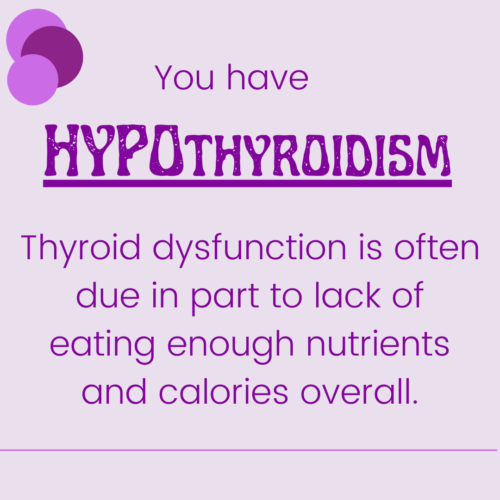
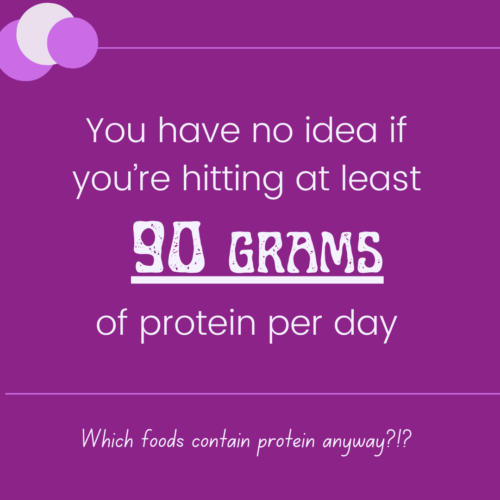
#5: You have no idea if you’re hitting at least 90g protein per day
And you wonder, which foods contain protein anyway?! 🤯
#6: You get SUPER hungry by evening, so anything goes for dinner.
Get this– even if you overeat in the evening, there’s a good chance you’re still undereating throughout the day. This means that you can be undereating AND overeating all in the same day. Talk about a rollercoaster for your metabolism. Undereating earlier in the day often shifts appetite and hormones to create excessive cravings later on.
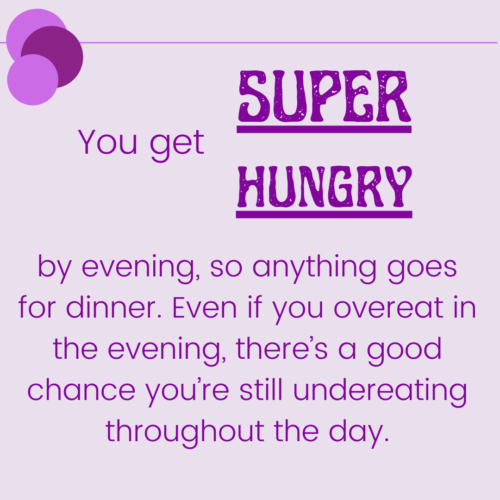
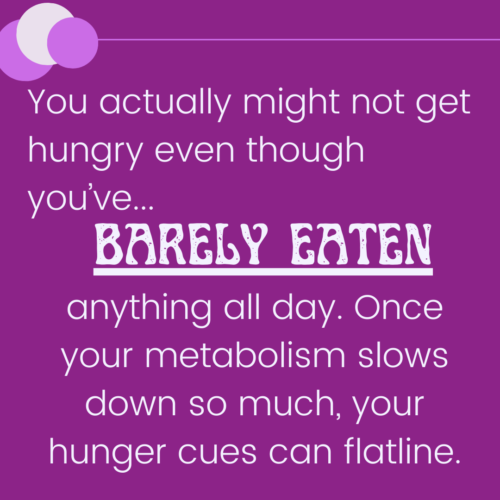
#7: You actually might not get hungry even though you’ve barely eaten anything all day.
Once your metabolism slows down so much, your hunger cues can flatline.
Eating Less Than 1,200 Calories But Not Losing Weight – Inspirational Client Story
I had a client who was eating just 800 CALORIES per day before working with me. This is the perfect story to answer the common question of “why am I gaining weight when I’m eating less?”.
And the kicker? ZERO weight loss was happening! Yet she was tracking, she was consistent. But not a budge in her weight. What WAS unfortunately changing for the worse was that she was more & more fatigued, her cycles were becoming irregular, and she found it hard to focus.
Here’s how my client lost weight while increasing her calories
With my help, she shifted to increasing her calories strategically from the right balance of foods (namely, protein, fat, and fiber in the right amounts for her). Her new daily calorie intake was 1,800 calories per day. This was 1,000 calories MORE per day than before and yet she still lost a pound that first month. In addition, she gained back her energy and normalized her cycles! So no longer was she eating less but gaining weight. Instead, she was eating more but losing weight!
Is it possible to eat more and still lose weight?
Absolutely! And in fact, the first thing you probably need to STOP doing that is preventing you from healing your metabolism is to STOP focusing on calorie restriction first!
Restricting calories in an already burdened metabolism is like kicking someone while they’re down. It further creates a burdened metabolism, making weight loss virtually impossible as well as creating cravings that often further stall weight loss.
So, I know what you’re going to ask– if I don’t start eating less, how the heck will I lose weight? Since after all, we’ve been told weight loss is all about “calories in, calories out”, right? Well, we need to think a bit more strategically.
How do I lose weight without restriction?
Here’s the 2 major reasons why weight loss is NOT just about being in a calorie deficit(aka eating less calories than you burn each day):
#1: Weight loss is not a passive process. It is a dynamic process that requires a TON of nutrients to enable fat loss/fat burning to occur.
That’s why simply lowering calories but without increasing the nutrient density (like eating highly processed but low calorie foods) can lead to nutrient deficiencies and stall weight loss.In fact, people most successful with long-term weight loss maintenance have been found to have higher vitamin and mineral intake.
#2: When we release weight from body fat storage, we also release toxins that are being stored in our fat tissue.
This is a protective process by our body to store a toxin in fat tissue if we are overtaxed with detox already / can’t get rid of it, so we stow it away. So, we need all of those NUTRIENTS (proteins, vitamins, minerals, antioxidants) in abundance to enable real detoxification to occur at an optimal level.
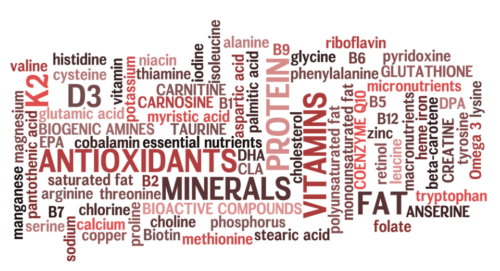
In my professional experience as a functional medicine dietitian specializing in weight loss and metabolic health, it is WAY more beneficial to focus on nutrient density than calories. As you can see for the reasons above, you can actually be eating less but gaining weight if you aren’t focusing on the key foundations that your metabolism needs to thrive. Nutrient repletion heals the metabolism. When you metabolism begins to heal, that’s when you finally unlock the ability to lose weight. To get more nutrients, I help my clients work on making the switch to eating real, whole or minimally processed foods high in nutrients as well as through targeted supplementation.
Nutrient Density Matters for Weight Loss
Have you ever tried to flip the switch to focus on NUTRIENTS when trying to lose weight? What does that look like? What to do instead of focusing on eating less and calorie restriction is to nourish your metabolism.
Priority actions to heal your metabolism include:
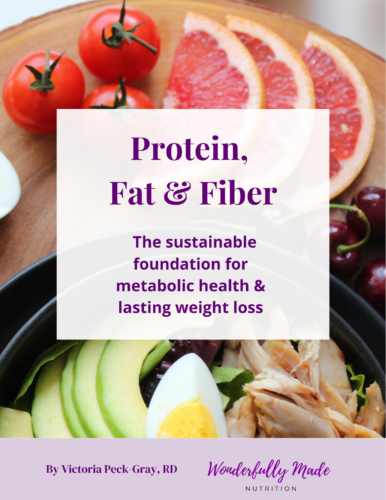
- Eat enough Protein, Fat & Fiber. This trio helps slow the breakdown of carbs, slowly releasing sugar into the blood over a longer period of time. This allows the body to maintain a stable range of blood sugar and therefore prevent quick spikes. The Protein, Fat, Fiber (PFF) Method rests largely on treating the root imbalance of hard to lose weight = blood sugar imbalance.
- Support insulin resistance and balance blood sugar when you eat even if you’re not diabetic. This happens to be one of the MOST IMPACTFUL things you can do to lose weight. Imbalanced blood sugar is a key driver of metabolic dysfunction, increased cravings, and weight gain.
- Eat real, whole or minimally processed foods high in nutrients.
- Avoid inflammatory foods, including excess sugar, excess carbs overall, industrial seed oils, and ultra processed foods.
What does eating nutrient dense meals look like?
Nutrient dense eating involves eating real, whole, or minimally processed foods since these naturally contain more nutrients. Focusing on getting nearly 30 grams of protein and 10 grams of fiber with healthy fats at every meal is the ultimate goal. You can find many PFF recipes on my website to get you started!
- Easy Turkey, Egg, and Pasta High Protein Casserole
- Healthy Broccoli Cheddar Soup with Greek Yogurt (High Protein)
- Collagen Protein Balls
- No Cook PFF Salad
- High Protein Chia Yogurt Breakfast Bowl
Not sure where to start?
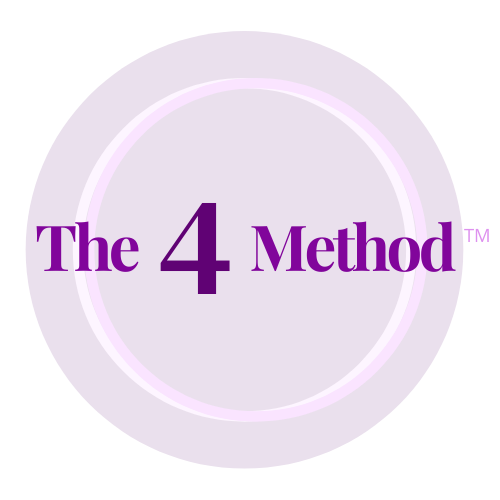
Consider joining my signature program, The 4 Method. This online group coaching program and community is where we ladies learn that eating MORE at each meal offers us so much freedom! The freedom of finally being able to lose weight and abolish cravings. The freedom from the energy we get when our metabolism begins to heal. And the freedom to not have to eat so often!
That doesn’t mean we then fast endlessly. No, I’m talking peacefully fasting for 4 hours between meals until you’re pleasantly hungry for the next meal. That means you just need 3 meals per day, and maybe a snack if any larger gaps occur.
Basically, you eat more at once, but less frequently. Sounds simple, because it is, and it’s also SO much better for sustainable weight loss.

Here’s why:
- You get to feel like a BOSS eating more at one time. So much more satisfying!
- More uninterrupted time between meals without worrying about what to eat every hour.
- Better relationship with food. No more codependent relationships with food!
- No more cravings!
- Fat free? Never again. Eat the whole-fat dairy and the chicken skin. These are nutrient dense anyway!
- Goodbye tasteless 100 calorie packs. You’re useless now.
- Say “never again” to the “eat as little as you can but all the time approaches” (I’m looking at you, WW & Noom)
With The 4 Method framework, you can have a heck of a lot more food / calories at each meal than you probably once did! And this, my friends, is SO much more fun and satisfying!
Eating enough at each meal is just one step of The 4 Method. Join the waitlist to stay tuned for the next round of the group program to jumpstart your weight loss and metabolic healing journey.
